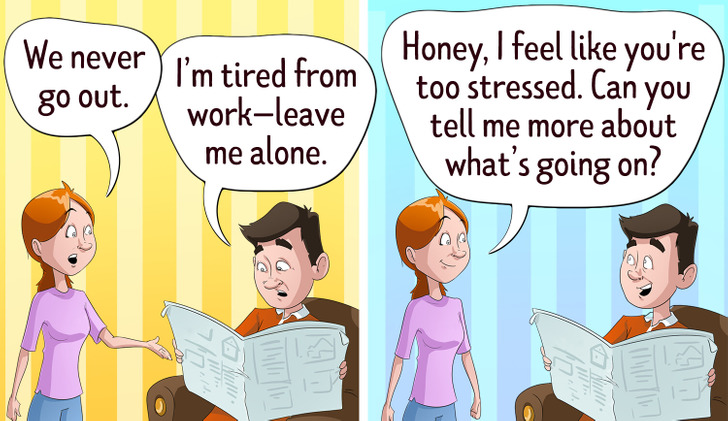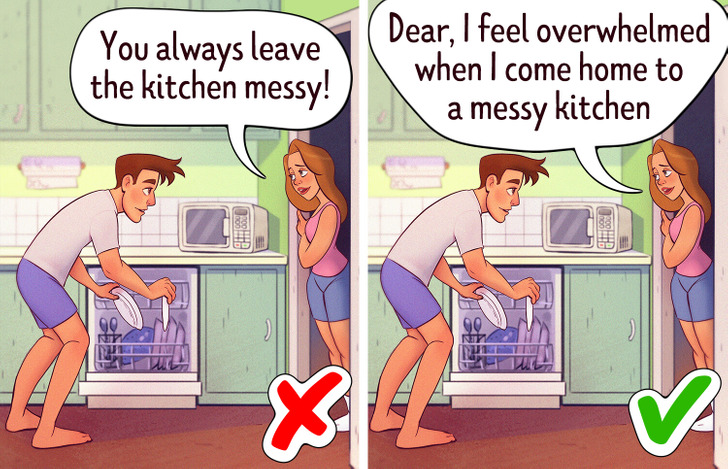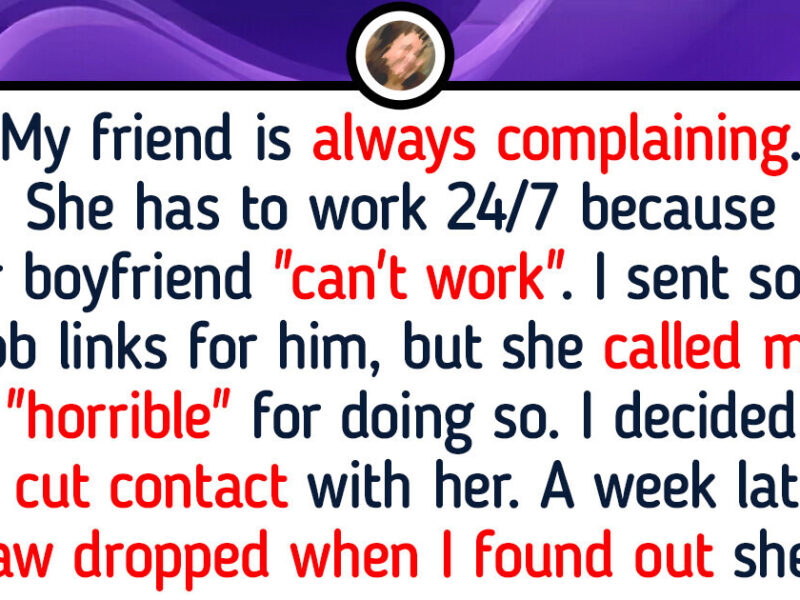10 Proper Ways to Talk to Your Partners, Even When You’re Upset / Bright Side
Good communication is the cornerstone of all happy and healthy relationships. It not only helps couples build trust and resolve conflicts but also fosters a strong emotional connection, especially when the initial excitement fades and partners face the realities of daily life.
The Secret to Thriving Relationships: Mastering Couple Communications
Let’s be honest: conversations in relationships can be challenging. In fact, a study conducted by the British Association for Counselling and Psychotherapy revealed that nearly 80% of couples seek therapy due to communication problems.
People are different in their way of expression, and where styles conflict, misunderstandings, frustration, and hurt feelings come to the fore. Learning to navigate your way around the communication in marriage or any partnership is essential to developing a solid and enduring union.
Here are 10 practical techniques which could help a couple improve their communications and develop deeper contact.
1. Active Listening: Show You’re There

Active listening remains probably the best tool in the whole area of conflict resolution within a relationship. So many times, we hear half of what has been said, but immediately start thinking of our response, and that’s what is taken away from the relationship conversations and escalates the arguments. To practice active listening, one needs to be wholly attentive to what one’s partner says without interruption or judgment.
When your partner speaks, listen to him. Each nod, direct eye contact, and “I see” or “Tell me more” indicates interest. This method helps improve talking to your partner, strengthening trust and understanding between you.
- Example:
Partner 1: “We never go out.”
Partner 2: “I’m tired from work—leave me alone.”
Partner 1: “Honey, I feel like you’re too stressed. Can you tell me more about what’s going on?”
2. Using “I Statements” to Express Yourself Without Blame

Mostly, relationships turn sour because the way partners communicate becomes one big blame battle. At this point, instead of uttering words that begin with “You always…” or “You never…” communicate using the phrase “I statements.” It is a great way of stating your feelings without attacking your partner.
For instance, instead of accusing your partner of leaving the kitchen untidy, it is better to use this approach to communicate your sentiments: “I feel overwhelmed since the kitchen is untidy.” This approach engenders a healthier marriage and enables the partners to be heard.
- Example:
Partner 1: “You always leave the kitchen messy!”
Partner 2: “Dear, I feel overwhelmed when I come home to a messy kitchen”
3. Non-Verbal Cues: The Unspoken Language of Relationships

Non-verbal communication is a huge part of communicating with your partner. Your tone of voice, facial expression, and your body language support or deny what you say. The more aware you are of those cues, the better you are at connecting and resolving.
Notice your partner’s non-verbal signals, too. If they seem upset or are holding back, open up discussions with open-ended questions. This habit is very important in improving communication amongst married couples or any long-term relationships.
- Example:
Partner 1: “I am angry over what happened in our last conversation.”
Partner 2: Maintains eye contact and nods, “Let’s discuss this. I need to understand how you feel.”
4. The Role of Empathy in Effective Couple Communication

Empathy forms the backbone of effective couple communication. It means being on the same page as your partner and recognizing his/her feelings, even when one does not wholeheartedly agree with them. This skill is bound to be helpful in negotiating emotional conversations and sorting out relationship arguments.
When your partner is upset or angry, acknowledge their feelings before you start to respond. A simple phrase like “That sounds really tough” or “I can understand why you feel that way” can change the tone of your entire conversation.
- Example:
Partner 1: “I was really looking forward to our weekend plans.”
Partner 2: “I know. I’m disappointed too. Let’s reschedule soon.”
5. Take a Break When Needed

Occasionally, relationship conversations can get too heated to continue constructively. Taking a time-out allows both partners to cool off and approach the discussion with clearer minds. This is a great strategy for conflict resolution in relationships with high emotions.
Establish a signal or phrase that means you need to take a break from the conversation. Use this time to reflect on your thoughts and feelings before resuming the conversation with increased focus.
- Example:
Partner 1: “I’m feeling overwhelmed. Can we pause and come back to this later?”
Partner 2: “That’s a good idea. Let’s revisit it in an hour.”
6. Identifying and Avoiding Common Communication Pitfalls
Certain habits, such as interrupting or dismissing your partner’s emotions, can manage to wreak havoc on even the best-laid intentions. Being aware of these pitfalls and making a conscious effort to avoid them is how you improve couple communications.
Rather than interrupt, allow your partner to finish their thoughts before responding. Instead of dismissing, validate their perspective, even if different from yours. These changes have the potential to transform the quality of your conversations.
7. Set the Right Tone in Emotional Discussions
How you begin a conversation often establishes the tone for its outcome. Handling sensitive topics with considerations and a willingness to listen would spark positive conversations. The method will be very helpful in terms of marital communication.
Begin with statements like, “I’d like to discuss something that’s been on my mind,” or “Can we talk about this when you have some time?” Such openings are respectful and provide space for open dialogue.
8. Building Better Listening Habits

But a very important part of talking to your partner is improving listening skills. Practice patience by focusing on their words without thinking of your response. Reflect back what you have just heard to confirm your understanding.
- Example:
Partner 1: “I am really stressed out about work deadlines.”
Partner 2: “It sounds like your workload is overwhelming. How can I help?”
9. Seek Help When Needed
Sometimes, couples need outside support in order to learn how to work through their issues. Counseling provides tools and techniques that can be helpful in improving communication and working through deeper issues. If you are having trouble with the strategies above, consider seeking help from a counselor to turn things around.
Couples therapy has been shown to be beneficial for many. Approximately 70-90% of couples find therapy helpful, with 90% reporting an increase in emotional well-being and comfort in their relationship after completing therapy with a trained therapist.
10. How to Strengthen Emotional Intelligence in a Relationship

The ability to identify and manage emotions is called emotional intelligence. Couples with improved self-awareness and empathy can more easily handle conflicts with respect for each other.
Effective couple communications require effort, patience, and a willingness to grow together. By practicing active listening, using “I statements,” paying attention to non-verbal cues, and showing empathy, you can create a stronger bond with your partner. Remember, every relationship has challenges, but with the right tools, you can overcome them and thrive together.
For more tips on talking to your partner and improving communication in marriage, consider exploring counseling resources or reading expert-backed articles. Building a healthy relationship is a journey, and every step brings you closer to lasting happiness.
Why saying “I Love You” too often could ruin your relationship and what to say instead. Click here to know why!






